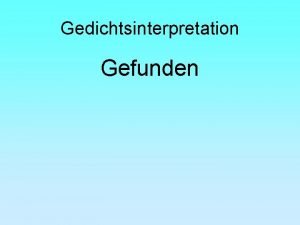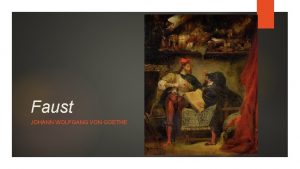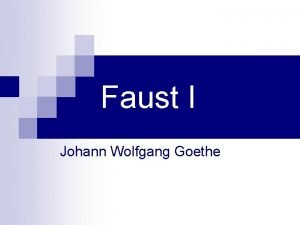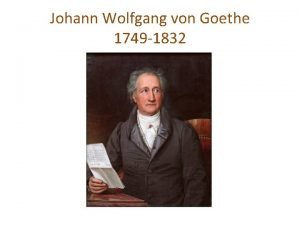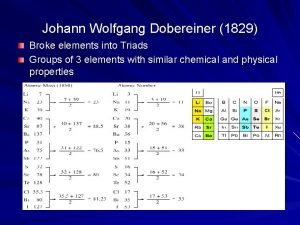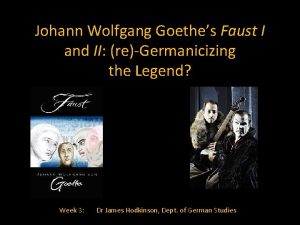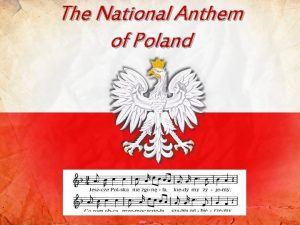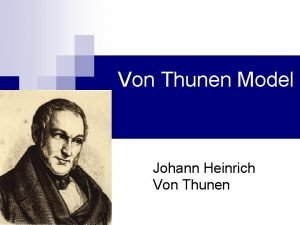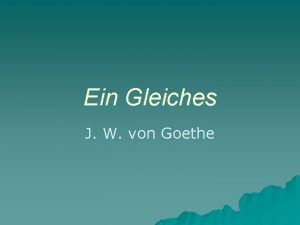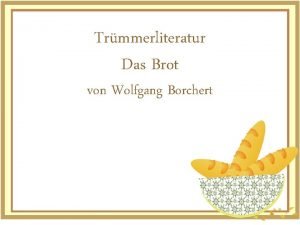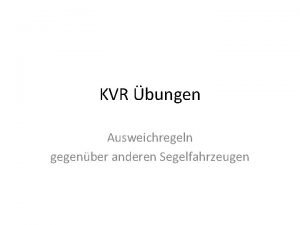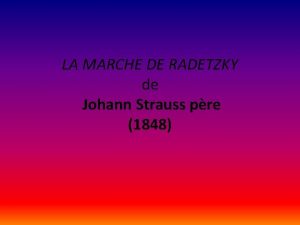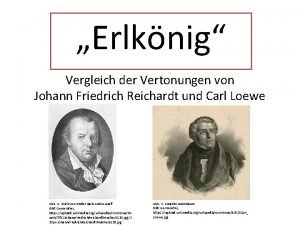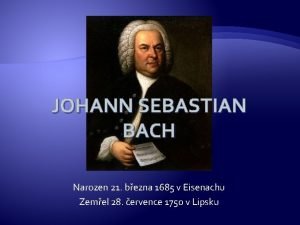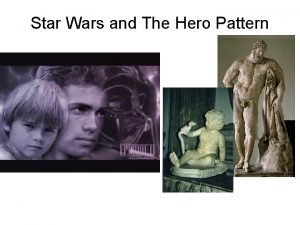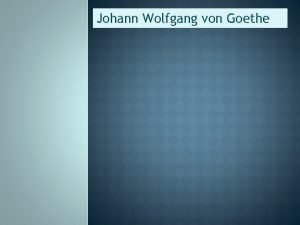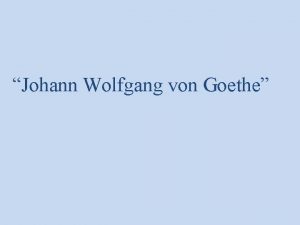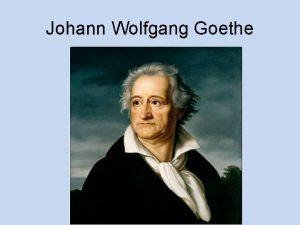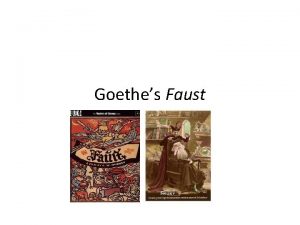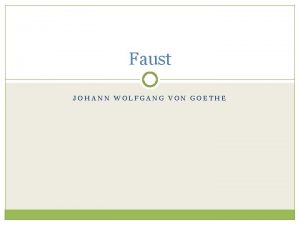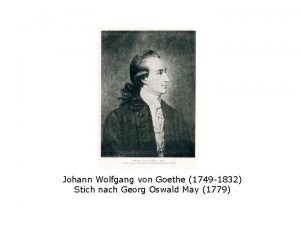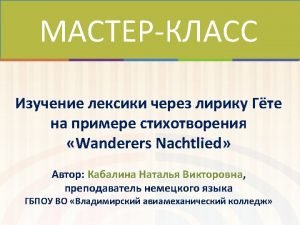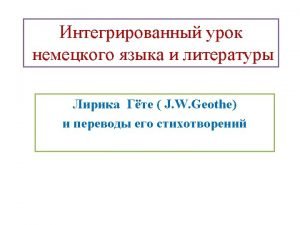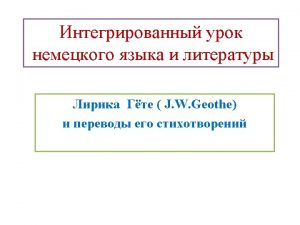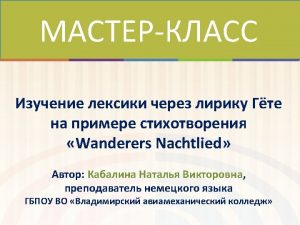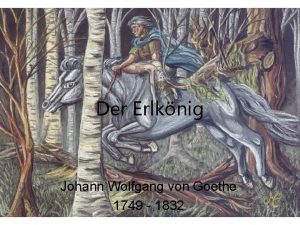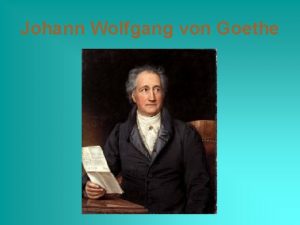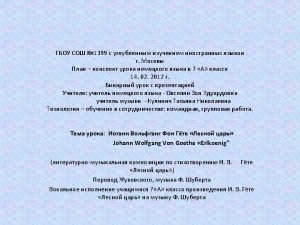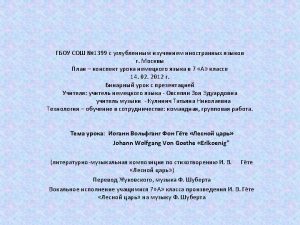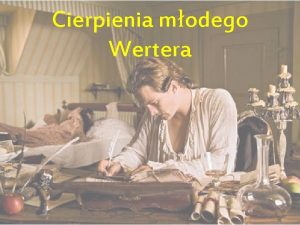Johann Wolfgang von Goethe August 28 1749 March



















- Slides: 19

Johann Wolfgang von Goethe August 28, 1749 -March 22, 1832

1. Author Information o o o Johann Wolfgang Von Goethe, (August 28, 1749 March 22 1832), is a German poet, playwright, novelist, and natural philosopher. He has written extensively about the relationship between language, translation and keeping the artistic styles.

Johann Wolfgang von Goethe

Importance o o widely recognized as the greatest writer of the German tradition The Romantic period in Germany (the late eighteenth and early nineteenth centuries) is known as the Age of Goethe, and Goethe embodies the concerns of the generation defined by the legacies of Jean-Jacques Rousseau, Immanuel Kant, and the French Revolution

Importance o o literary achievements as a lyric poet, novelist, and dramatist significant contributions as a scientist (geologist, botanist, anatomist, physicist, historian of science) critic and theorist of literature and of art for the last thirty years of his life he was Germany's greatest cultural monument, serving as an object of pilgrimage from all over Europe and even from the United States and leaving the small town of Weimar a major cultural center for decades after his death

Johann Wolfgang von Goethe

Johann Wolfgang von Goethe’s translation theory o It is possible to summarize theoretical approach of Goethe on translation in three main points: o 1. Translation is the process which deals with conveying the unity of the thought. o 2. Translation is the imitation or even copying of the original text in the target language with a different group of signs.

Johann Wolfgang Von Goethe’s translation theory o 3. Translation is not only taking out the meaning of the original text, it is the process of conveying the rhetoric, wording styles, and rhythmic elements in the text at the same time.

Johann Wolfgang Von Goethe’s translation theory o It can be deduced that Goethe does not leave aside the artistic elements in the translations of the texts; instead he props that the unity of the text from the thought and originality aspects should be reserved totally if possible.

Johann Wolfgang Von Goethe

In the article Goethe deals with… Goethe’s scheme is tripartite, namely, it constitutes of three main parts pointing to his claim being that every literature must pass through three phases of translation. The phases moves in a circular fashion and can also be found taking place at the same time according to different foreign languages or genres.

In the article Goethe deals with… o In the first period of translation readers get familiar with the target culture in their own terms. o The example pointed was that of Luther’s German Bible where the foreign matter entered the daily lives.

In the article Goethe deals with… o In the second phase the translator tends to enter a foreign consciousness and then reconstruct it in his own expressions assimilating it in his system. This phase is called ‘parodistic’ by Goethe. o The translator enriches himself in this phase but does so by staying within the limits of his own sensibility.

In the article Goethe deals with… o In the third phase which is regarded as the highest there was a perfect identity between the source language text and target language text. o The translator did not have to be taken for the original, but could exist in his own right.

In the article Goethe deals with… o Goethe's distinction between the three levels—or epochs—of translation runs contrary to the hierarchies in translation we are used to working with today. o Goethe favors an exact rendering of meaning, form, images, and style from one language to the next, not at the expense of the receiving one, but rather for its enrichment!

Johann Wolfgang Von Goethe

o He finds translations which attempt to convey spirit and style of the original work by using equivalents of syntax and idiom (the French School) of only limited value, and he allows the free/prose adaptation, which conveys the spirit but has to alter style, structure, grammar, and idiom of the original only as a first "reading help. “

o Walter Benjamin, in "The Task of the Translator, " refers to Goethe's Noten as "the best comment on theory of translation that has been published in Germany.

Johann Wolfgang Von Goethe
 Ich ging im walde so für mich hin noten
Ich ging im walde so für mich hin noten Johann wolfgang von goethe plays
Johann wolfgang von goethe plays Faust kindsmord
Faust kindsmord 1749 wurde geboren
1749 wurde geboren 1823-1749
1823-1749 Johann wolfgang dobereiner
Johann wolfgang dobereiner Wolfgang amadeus goethe
Wolfgang amadeus goethe March april may june july
March april may june july Poland national anthem lyrics
Poland national anthem lyrics Bid rent theory model
Bid rent theory model Wanderers nachtlied
Wanderers nachtlied Wer ist mozart
Wer ist mozart Borchert das brot
Borchert das brot Erasmus von rotterdam beeinflusst von
Erasmus von rotterdam beeinflusst von Wind von backbord weicht wind von steuerbord
Wind von backbord weicht wind von steuerbord Johann strauss père marche de radetzky
Johann strauss père marche de radetzky Erlkönig johann friedrich reichardt
Erlkönig johann friedrich reichardt Johann sebastian bach děti
Johann sebastian bach děti Oktaaf se getal reels
Oktaaf se getal reels Hero patterns
Hero patterns
